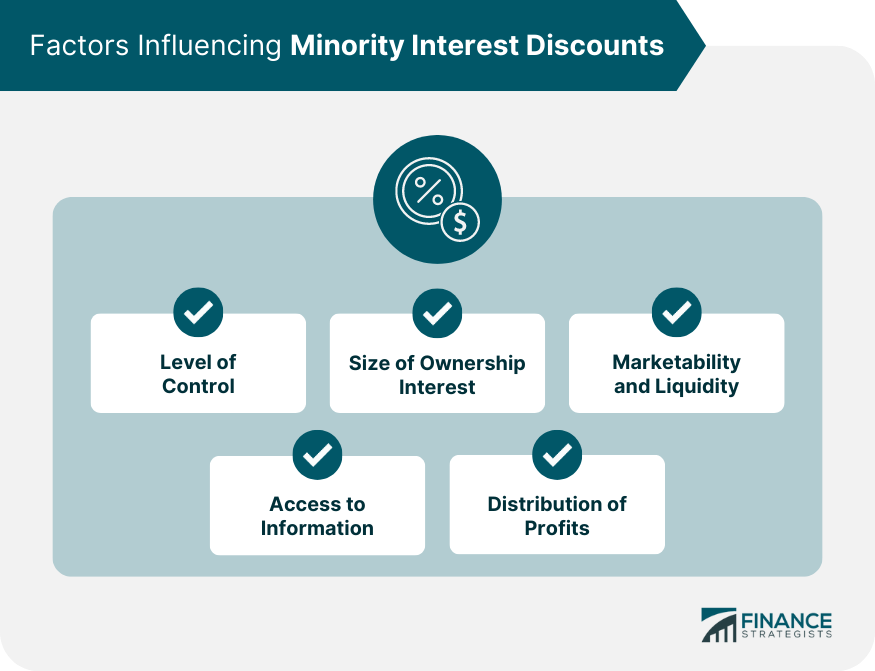A minority interest discount refers to a reduction in the value of a minority ownership interest in a business due to the lack of control that a minority owner possesses. This discount reflects the decreased value of an ownership stake that does not have the authority to influence business decisions or operations. In business valuation, minority interest discounts are crucial for accurately assessing the value of minority ownership stakes. This discount is essential to account for the differences between controlling and non-controlling ownership interests, providing a more accurate representation of an investment's worth. The level of control a minority shareholder has over the business significantly impacts the value of their ownership interest. The less control an investor has, the higher the minority interest discount. The size of the ownership interest also influences the minority interest discount. Smaller stakes typically command higher discounts due to their limited ability to influence the business. Minority interests are often less marketable and liquid than controlling interests, which can lead to higher discounts. This is because minority shareholders may face challenges in finding buyers for their stakes or may need to sell at a reduced price. Limited access to company information can also contribute to higher minority interest discounts. Minority shareholders may not receive the same level of financial or operational data as controlling shareholders, which can reduce the attractiveness of their investment. Minority shareholders may have limited ability to influence the distribution of profits, which can result in higher discounts. This factor can impact the perceived value of their investment, as it may be challenging to realize gains or recover their initial investment. The comparable transactions method involves analyzing similar transactions in the market to determine an appropriate minority interest discount. This approach requires data on transactions involving minority stakes in comparable companies. The guideline public company method compares the subject company to publicly traded companies in the same industry. This approach relies on market data to calculate an appropriate minority interest discount based on observed discounts in public markets. The discounted cash flow method involves projecting the future cash flows of the business and discounting them back to the present value. To calculate the minority interest discount, this method adjusts the discount rate to reflect the lack of control associated with a minority stake. The capitalization of earnings method values a business by capitalizing its historical earnings. This approach considers the minority interest discount by adjusting the capitalization rate to account for the risks and limitations associated with minority ownership. In mergers and acquisitions, minority interest discounts can affect the transaction price, as buyers may be willing to pay less for a non-controlling stake. Minority interest discounts are essential in buy-ins and buyouts, as they impact the value of the ownership interest being bought or sold. In divorce settlements, minority interest discounts can influence the division of assets, as they affect the value of any minority-owned business interests. For estate and gift tax planning purposes, minority interest discounts may be necessary to accurately value minority-owned business interests for tax reporting. In litigation situations, minority interest discounts can be crucial in resolving disputes involving the valuation of minority-owned business interests. Engaging a valuation professional with expertise in business valuation ensures that the process of calculating minority interest discounts is accurate and reliable. These professionals are skilled in applying the appropriate valuation methods and adjusting for the specific factors that impact minority ownership interests. Valuation professionals are knowledgeable about the regulatory and compliance issues surrounding business valuation, including the proper application of minority interest discounts. Their expertise can help ensure that valuations adhere to the relevant guidelines and standards, minimizing the risk of disputes or challenges. Valuation professionals have access to relevant market data, which is crucial for accurately determining minority interest discounts. This data can provide insight into the discounts applied in comparable transactions and public markets, helping to support the valuation process and provide a strong foundation for the discount calculations. The accurate calculation of minority interest discounts is essential in various valuation scenarios, including mergers and acquisitions, buy-ins and buyouts, divorce settlements, estate and gift tax planning, and litigation support. These discounts ensure that the value of minority ownership interests is appropriately adjusted for the limitations and risks associated with non-controlling stakes. Selecting the appropriate valuation approach and engaging a skilled valuation professional are critical for accurately calculating minority interest discounts. By considering the specific factors that impact minority ownership interests and using the appropriate valuation methods, investors, business owners, and other stakeholders can better understand the true value of minority stakes in a business.What Is a Minority Interest Discount?
Factors Influencing Minority Interest Discounts
Level of Control
Size of Ownership Interest
Marketability and Liquidity
Access to Information
Distribution of Profits

Valuation Methods to Calculate Minority Interest Discounts
Market Approach
Comparable Transactions Method
Guideline Public Company Method
Income Approach
Discounted Cash Flow Method
Capitalization of Earnings Method
Minority Interest Discounts in Different Valuation Scenarios
Mergers and Acquisitions
Buy-Ins and Buyouts
Divorce Settlements
Estate and Gift Tax Planning
Litigation Support
Importance of Engaging a Valuation Professional
Expertise in Business Valuation
Understanding of Regulatory and Compliance Issues
Access to Relevant Market Data

Conclusion
Minority Interest Discount FAQs
A minority interest discount is a reduction in the value of an ownership interest in a company that is less than 50% of the total shares outstanding. This discount is applied to account for the lack of control and voting rights that come with a minority interest.
A minority interest discount is used to account for the fact that a minority shareholder has limited control over the operations and direction of a company. Because they cannot make major decisions or influence the board of directors, their ownership interest is considered less valuable than a controlling interest.
The minority interest discount is typically calculated as a percentage reduction from the pro rata value of the company. The percentage used may vary depending on factors such as the size of the ownership interest, the level of control held by the majority shareholder, and the company's financial performance.
A minority interest discount may be applied in situations such as estate planning, where a portion of a company is being passed on to heirs, or in the sale of a minority stake to an outside investor. It may also be used in the valuation of closely-held companies or partnerships where one partner holds a minority interest.
Business valuation experts and appraisers typically apply minority interest discounts in the valuation of companies and ownership interests. This may include professionals such as Certified Business Appraisers (CBAs) or Certified Valuation Analysts (CVAs).
True Tamplin is a published author, public speaker, CEO of UpDigital, and founder of Finance Strategists.
True is a Certified Educator in Personal Finance (CEPF®), author of The Handy Financial Ratios Guide, a member of the Society for Advancing Business Editing and Writing, contributes to his financial education site, Finance Strategists, and has spoken to various financial communities such as the CFA Institute, as well as university students like his Alma mater, Biola University, where he received a bachelor of science in business and data analytics.
To learn more about True, visit his personal website or view his author profiles on Amazon, Nasdaq and Forbes.















